Mastering the Six Core Skills of ACT for Psychological Flexibility
Story
It was a fine day in Bullsville, and David had just returned home after a long day at work. He had started his own company in his early 20s, but despite its success, David often needed more time to start another business. He tried everything from traditional talk therapy to self-help books, but nothing worked.
One day, while browsing in the village library, David stumbled upon a book called “Values in Therapy.” Intrigued, he delved into it and discovered a new framework from behavioral psychology called Acceptance and Commitment Therapy (ACT). This new approach helped individuals recognize how their thoughts influenced their behavior and offered tools for debugging when their minds got stuck.

As David read further, he realized that this new therapy could help him recognize where his mind was adding to the stress of running a company and preventing him from finding meaning and enjoyment in his work. So he decided to explore ACT further and enrolled in a training program to become a certified Acceptance and Commitment Trainer.
As he learned more about ACT, David realized that this therapy could help others struggling with uncertainty and stress. So he decided to start his own coaching business and offer Acceptance and Commitment Training to his clients. David began to thrive with his new skills and a renewed sense of purpose.
One day, David met a young woman named Elizabeth at a local coffee shop. They started a conversation, and David soon discovered that Elizabeth was struggling with similar issues that he had experienced in his own life. He shared his story with her, and she was amazed by how much he had overcome.
David offered to help Elizabeth by coaching her in ACT. Together, they explored the power of their thoughts and worked on ways to identify when their minds were getting stuck. As a result, Elizabeth began to see the world in a new light and soon found herself thriving.
Over time, David’s coaching business grew, and he became a respected figure in the community. He had found meaning and enjoyment in his work, and his clients were thriving under his guidance. Looking back on his journey, he realized that his struggles had led him to discover ACT and help others similarly.
Ultimately, David realized that the key to a fulfilling life was not just about business success but also about finding meaning and purpose in everything he did. With this newfound wisdom, David continued to help others and live a successful and fulfilling life.
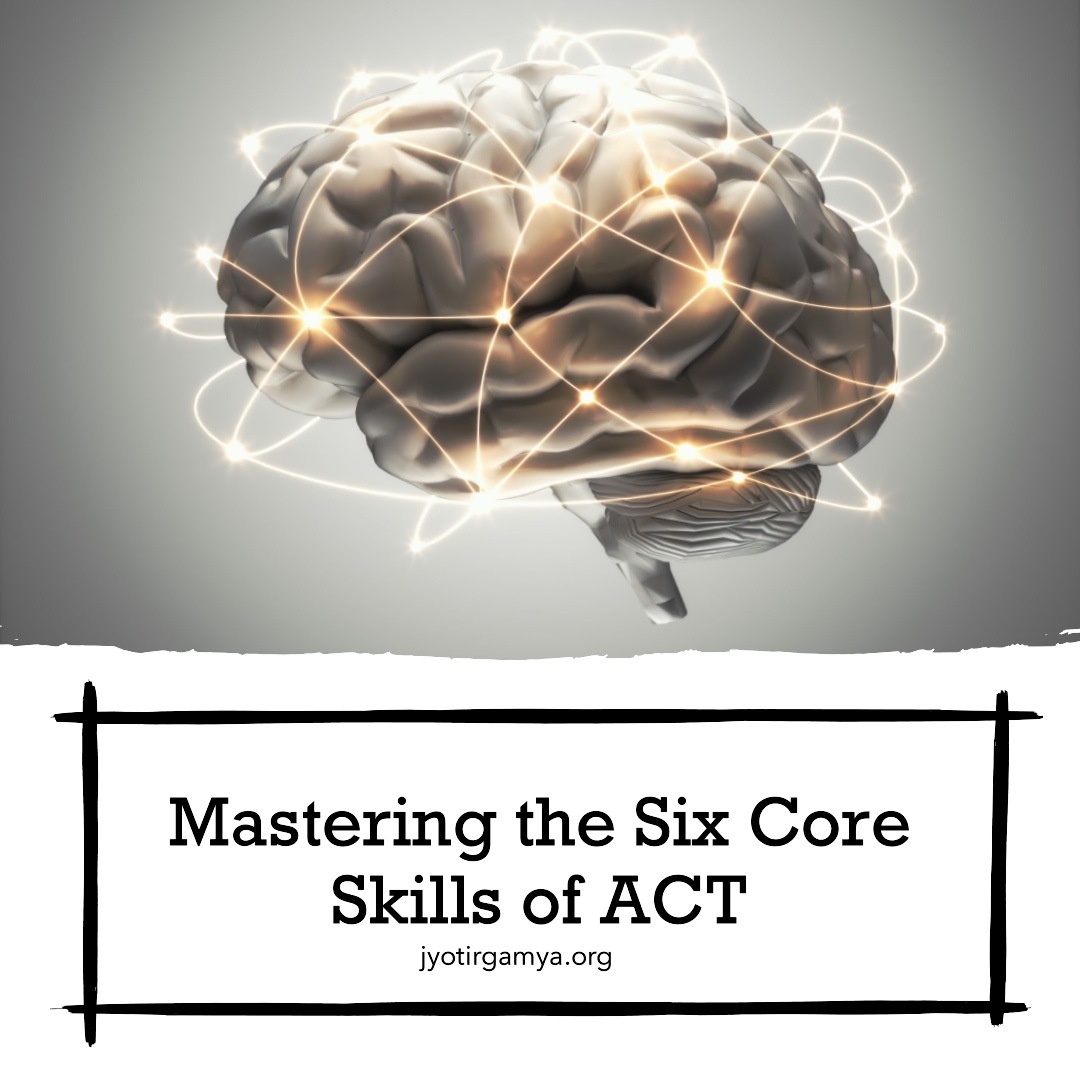
1. Introduction
Acceptance and Commitment Therapy (ACT) is a behavior-based psychotherapy that helps individuals develop psychological flexibility and improve their quality of life. The therapy aims to promote acceptance of thoughts, feelings, and experiences. In this, we explore the definition of ACT, its importance, and the six core skills underpinning this therapy.
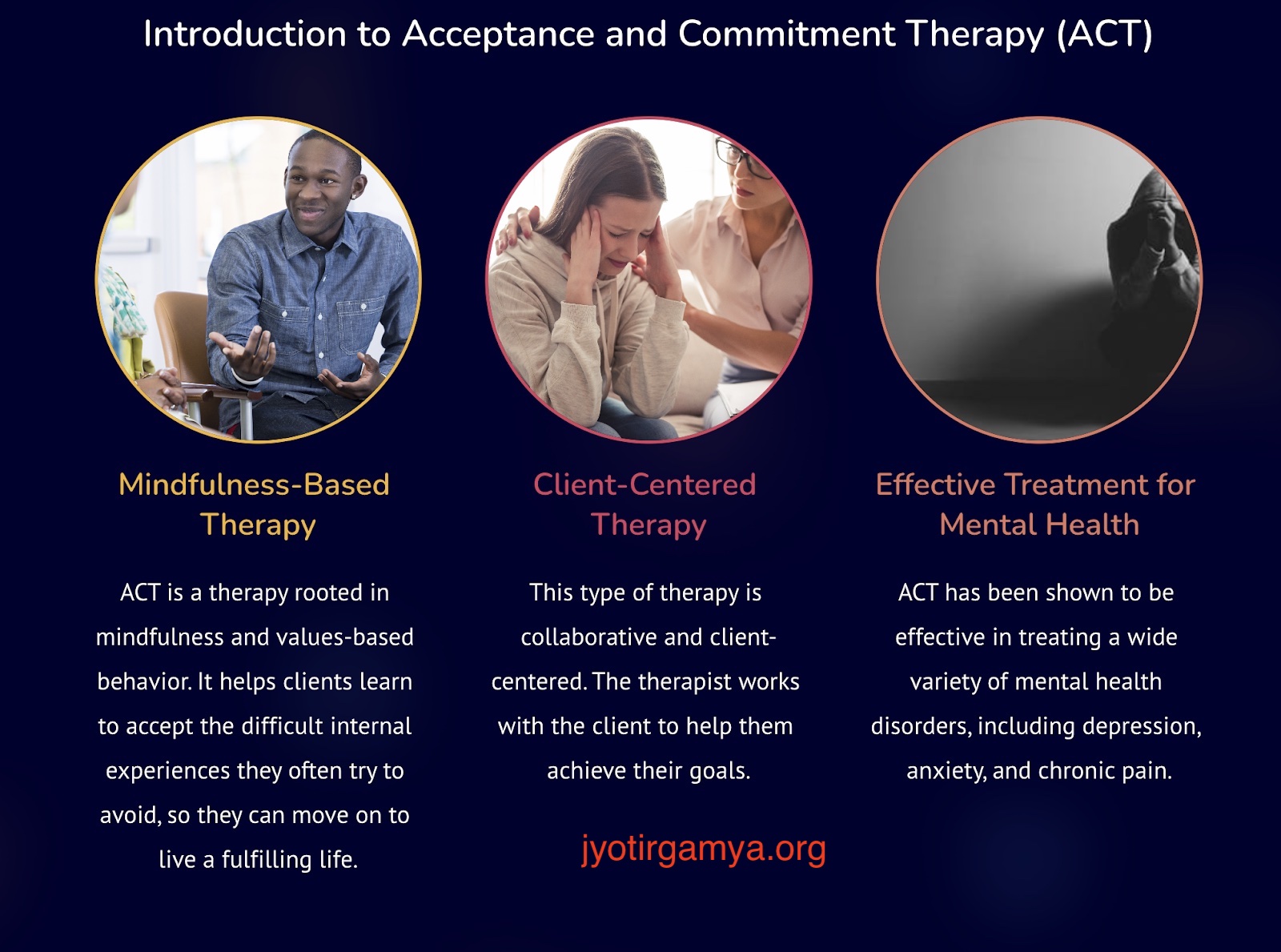
1.1 Definition of ACT
ACT is a third-wave cognitive-behavioral therapy that uses mindfulness practices and values-based action to improve mental health outcomes. It is based on the assumption that suffering arises from attempts to control or avoid negative experiences. It proposes that acceptance of these experiences and commitment to personal values can lead to a more fulfilling life. ACT aims to help individuals create a psychological distance from their thoughts rather than fighting or trying to change them. The therapy emphasizes the importance of being present at the moment, focusing on the here and now, and connecting with personal values to create a sense of purpose and direction.
1.2 Importance of ACT
ACT treats various mental health conditions, including anxiety, depression, and post-traumatic stress disorder (PTSD). It has also been used to improve overall well-being and promote psychological flexibility in individuals who do not necessarily have a diagnosed mental health condition. ACT benefits individuals who struggle with emotional regulation, providing them with tools to accept and manage difficult emotions. The therapy is highly valued for its focus on personal values, encouraging individuals to live more meaningfully and purposefully.
1.3 Six core skills in ACT for psychological flexibility
Six core skills underpin ACT, each of which contributes to the development of psychological flexibility. These six skills are experiential avoidance willingness, fusion to defusion, past/future to present-moment awareness, rigid stories to flexible perspective-taking, lack of direction to clear values, and the interconnectedness of these core processes. In the following sections, we will discuss these core skills in more detail and explain how they contribute to psychological flexibility.
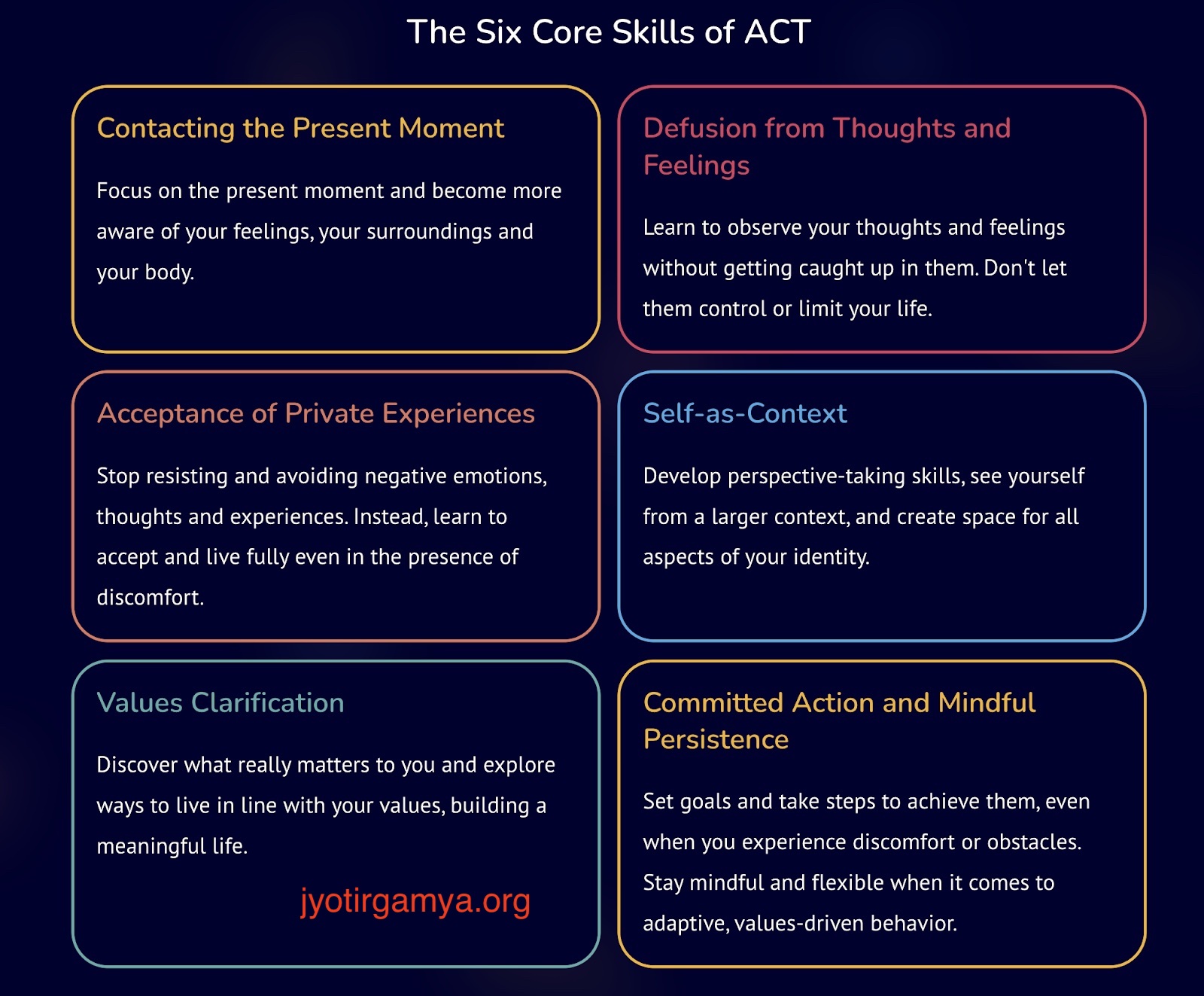
2. Experiential Avoidance Willingness
Experiential avoidance is a typical pattern of behavior in which individuals try to avoid or control unwanted thoughts, emotions, or sensations. This can include engaging in activities that distract from or numb these experiences and attempts to suppress or eliminate them. While this may provide temporary relief, it often leads to negative long-term consequences, including increased anxiety and depression and a lack of personal growth.
2.1 Definition of experiential avoidance
It refers to avoiding, suppressing, or controlling unwanted thoughts, feelings, and physical sensations. It can lead to various adverse outcomes, including reinforcement of negative beliefs and lack of personal growth. In ACT, experiential avoidance is viewed as a significant barrier to psychological flexibility and is addressed through willingness development.
2.2 Negative effects of avoiding complex thoughts and feelings
Avoiding complex thoughts and feelings can negatively affect mental health and overall well-being. For example, research has shown that individuals who engage in experiential avoidance are more likely to experience anxiety and depression and are less likely to engage in positive behaviors. Additionally, avoidance can lead to a lack of personal growth and the reinforcement of negative beliefs and self-talk.
2.3 Importance of willingness
Willingness is the ability to remain open and accepting towards complex thoughts, feelings, and experiences without trying to control or avoid them. It is a critical component of ACT, as it promotes psychological flexibility and helps individuals move toward their values. Willingness encourages individuals to accept discomfort as a normal part of life and to engage in behaviors consistent with their values, even under challenging emotions.
2.4 The role of experiential avoidance in finding the path to the life we want
It can be a significant barrier to living a fulfilling life. By avoiding difficult emotions, individuals may miss out on opportunities for personal growth and become stuck in negative behavior patterns. Developing willingness allows individuals to move towards their values, even under challenging emotions, and create a more meaningful and fulfilling life.
2.5 How to develop a willingness
Several strategies can be used to develop willingness, including mindfulness practices, exposure therapy, and value clarification exercises. Mindfulness practices can help individuals become more aware of their thoughts and emotions, while exposure therapy can help individuals face their fears in a controlled environment. Values clarification exercises can help identify actions consistent with their values. Through the development of willingness, individuals can become more flexible in behavior and accept difficult emotions, leading to improved mental health outcomes.
3. Fusion to Defusion
In the context of Acceptance and Commitment Therapy (ACT), fusion refers to a state in which an individual becomes overly identified with their thoughts and emotions, leading to the development of rigid thought patterns and behavior. Defusion, on the other hand, involves the process of distancing oneself from thoughts and emotions and being able to observe them without judgment or attachment. By learning to defuse negative thoughts and emotions, individuals can cultivate greater psychological flexibility, which is essential for coping with life’s challenges.
3.1 Definition of fusion
Fusion is when an individual becomes overly identified with their thoughts and emotions, developing rigid thought patterns and behavior. It is a phenomenon that can cause significant distress and interfere with an individual’s ability to function effectively in their daily life.
3.2 Negative effects of fusion
The adverse effects of fusion can be far-reaching and impact an individual’s emotional, social, and physical well-being. For example, being overly attached to negative thoughts can lead to anxiety, depression, and feelings of hopelessness. It can also lead to a reduced sense of self-efficacy and undermine an individual’s ability to achieve their goals.
3.3 Importance of defusion
Defusion is essential in ACT because it allows individuals to break free from rigid thought patterns and develop greater psychological flexibility. Individuals can observe themselves without becoming overly attached or reactive by learning to distance themselves from their thoughts and emotions. This allows them to understand their experiences better and respond more effectively to life’s challenges.
3.4 The Role of Defusion in achieving our goals
Defusion plays a critical role in achieving our goals by helping us to break free from self-limiting beliefs and negative thought patterns that can hinder progress. When we defuse negative thoughts and emotions, we become more open to new experiences and better adapt to changing circumstances. This increased flexibility can help us to achieve our goals more effectively and lead a more fulfilling life.
3.5 Examples of Fusion in daily life
Fusion can manifest in many ways in our daily lives. For example, an individual overly attached to the idea of success may become rigid in their thinking and behavior, making it difficult to adapt to changing circumstances or accept failure. Similarly, an overly attached to their self-critical thoughts may become trapped in a cycle of self-doubt, making it difficult to take action or pursue their goals.
3.6 How to practice defusion
There are several techniques that individuals can use, including mindfulness, visualization, and cognitive restructuring. Mindfulness involves paying attention to the present moment without judgment, which can help to reduce the power of negative thoughts and emotions. Visualization involves creating a mental image of a negative thought or emotion and distancing oneself from it. Finally, cognitive restructuring involves challenging negative thoughts and beliefs and replacing them with more positive and adaptive ones. By practicing these techniques regularly, individuals can learn to defuse negative thoughts and emotions and develop greater psychological flexibility.
4. Past/Future to Present Awareness
4.1 Definition of Past/Future Preoccupation
Past and future preoccupation refers to the tendency to dwell on past experiences and worry about future events rather than focusing on the present moment. People preoccupied with the past may ruminate on negative experiences or regrets, while those preoccupied with the future may experience anxiety or fear about what is yet to come. This can prevent individuals from fully engaging in their present experiences and hinder psychological flexibility.
4.2 Negative effects of past/future Preoccupation
Past/future preoccupation can adversely affect mental health and well-being. For example, research has shown that excessive focus on the past can lead to symptoms of depression and anxiety. In contrast, excessive focus on the future can lead to symptoms of anxiety and worry. Additionally, past/future preoccupation can interfere with the ability to connect with others in the present moment, leading to social isolation and loneliness.
4.3 Importance of present awareness
Present-moment awareness is a core skill in Acceptance and Commitment Therapy (ACT) that involves paying attention to recent experiences with openness and curiosity. Developing present-moment awareness can help individuals to manage difficult emotions better, reduce stress and anxiety, and improve overall well-being. It can also enhance connecting with others and engaging in meaningful activities.
4.4 How to develop the skill of present-moment awareness
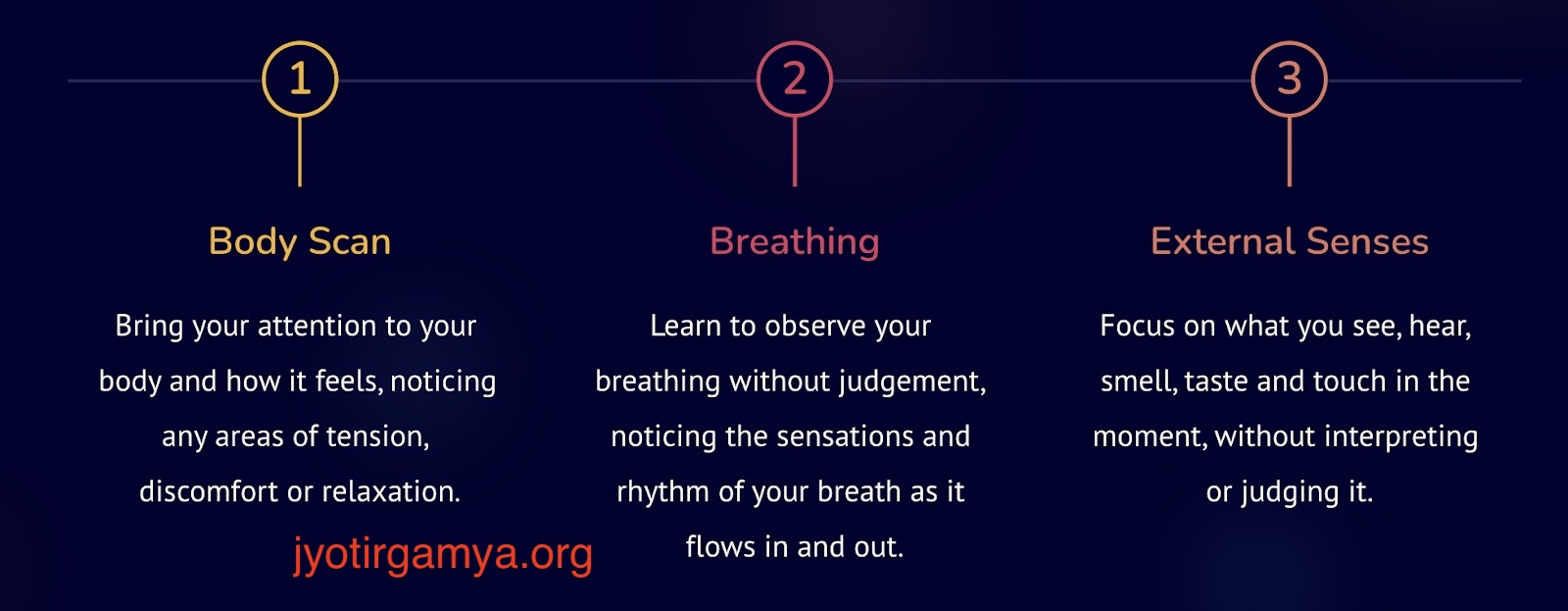
Developing the skill of present-moment awareness involves intentionally directing attention to present experiences without judgment. Mindfulness meditation is a commonly used technique for cultivating present-moment awareness. This involves focusing on the breath or other physical sensations and gently redirecting the mind to the moment it wanders. In addition, activities such as yoga, tai chi, and walking in nature can promote present-moment awareness.
4.5 How past/future preoccupation hinders flexibility
Past/future preoccupation can hinder psychological flexibility by limiting the ability to adapt to new situations and experiences. When individuals are preoccupied with the past or future, they may become stuck in old thinking and behavior patterns, preventing growth and change. By developing present-moment awareness, individuals can learn to be more flexible in their thinking and behavior, allowing them to respond more effectively to new situations and experiences.
5. Rigid Stories to Flexible Perspective-Taking
5.1 Definition of rigid stories
Rigid stories are the beliefs and narratives we construct about ourselves and others that are narrow and inflexible. These stories are often based on past experiences and biases and can limit our ability to see alternative perspectives or possibilities.
5.2 Negative Effects of rigid stories
Rigid stories can harm our mental health and well-being, leading to anxiety, depression, and a lack of adaptability. They can also lead to conflict in our personal and professional relationships, as we may struggle to empathize with others or accept alternative viewpoints.
5.3 Importance of flexible perspective-taking
Flexible perspective-taking involves being open-minded and receptive to alternative perspectives, even if they challenge our pre-existing beliefs. This skill can help us build stronger relationships, foster creativity and innovation, and adapt quickly to change.
5.4 How to develop the skill of flexible perspective-taking
It involves actively seeking different viewpoints and perspectives and questioning our assumptions and beliefs. In addition, cognitive-behavioral therapy (CBT) and mindfulness practices can also help us become more aware of our biases and challenge rigid thinking patterns.
5.5 The impact of rigid stories on interpersonal relationships
Rigid stories can impact our interpersonal relationships by limiting our ability to empathize with others and understand their perspectives. This can lead to misunderstandings, conflict, and strained relationships. Developing flexible perspective-taking skills can help us build stronger, more meaningful relationships with others.
5.6 The relationship between rigid stories and imposter syndrome
It is a phenomenon where individuals doubt their accomplishments and fear being exposed to fraud. Rigid stories can contribute to imposter syndrome by reinforcing negative self-beliefs and limiting our ability to see our strengths and accomplishments. Developing flexible perspective-taking skills can help challenge these negative self-beliefs and promote a more positive self-image.
6. Lack of Direction to Clear Values
As humans, we all crave a sense of direction and purpose. However, at times, we may find ourselves needing guidance or direction to take. This can lead to feelings of anxiety, depression, and dissatisfaction with our lives. The good news is that clarifying our values can overcome a lack of direction.
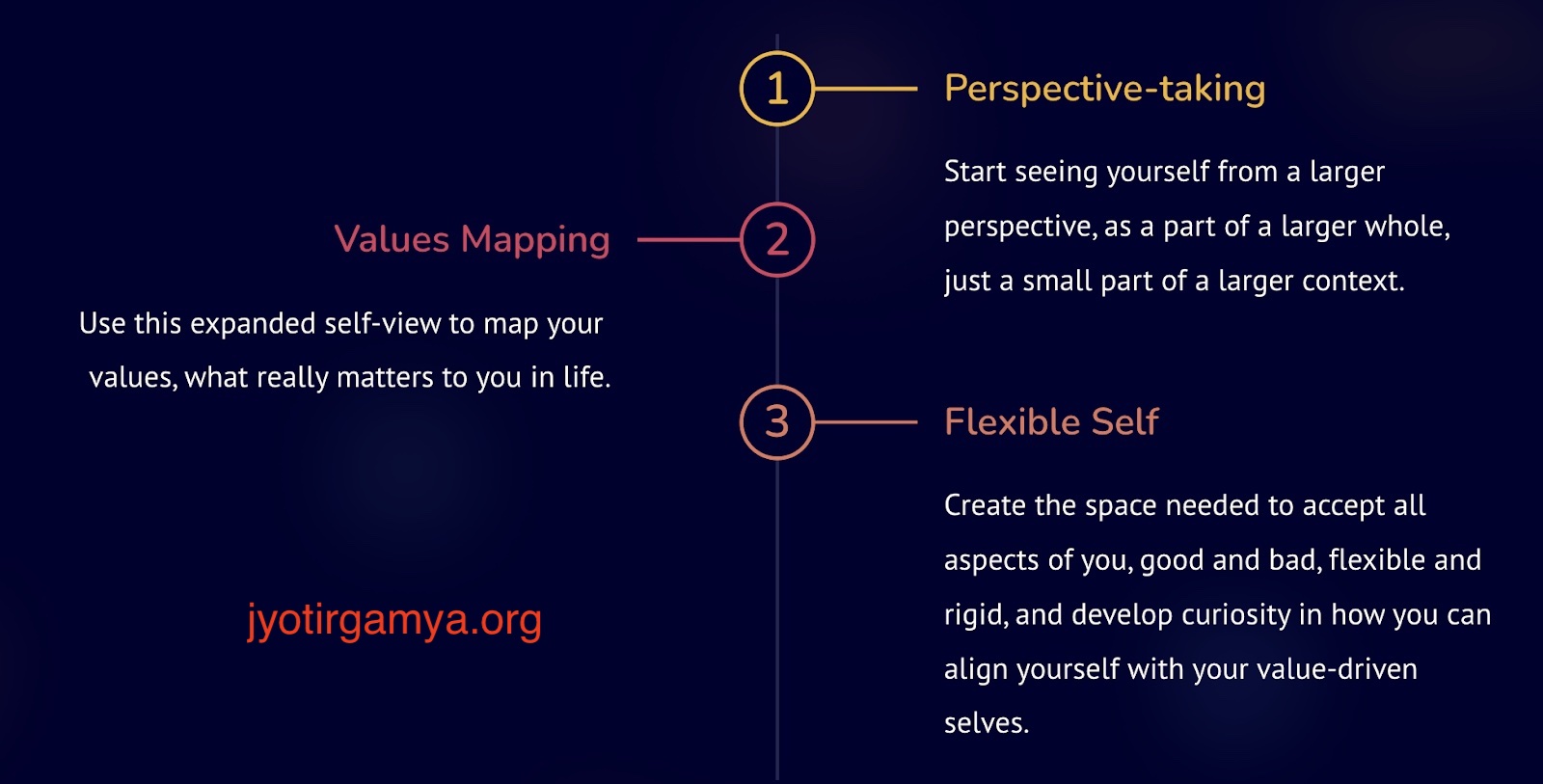
6.1 Definition of lack of direction
A lack of direction refers to certainty or clarity about one’s life path or purpose. It is a common experience that various factors, such as transitions in life stages, loss of a job, or a significant life event, can cause.
6.2 Negative effects of lack of direction
It can hurt our mental health and well-being. It can lead to feelings of anxiety, depression, and hopelessness. Additionally, it can result in a lack of motivation and productivity and a sense of being stuck in life.
6.3 Importance of clarifying our values
It is essential to finding direction in life. When we know what is truly important to us, we can make decisions and take action that aligns with our values. This creates a sense of purpose and direction that can lead to a more fulfilling life.
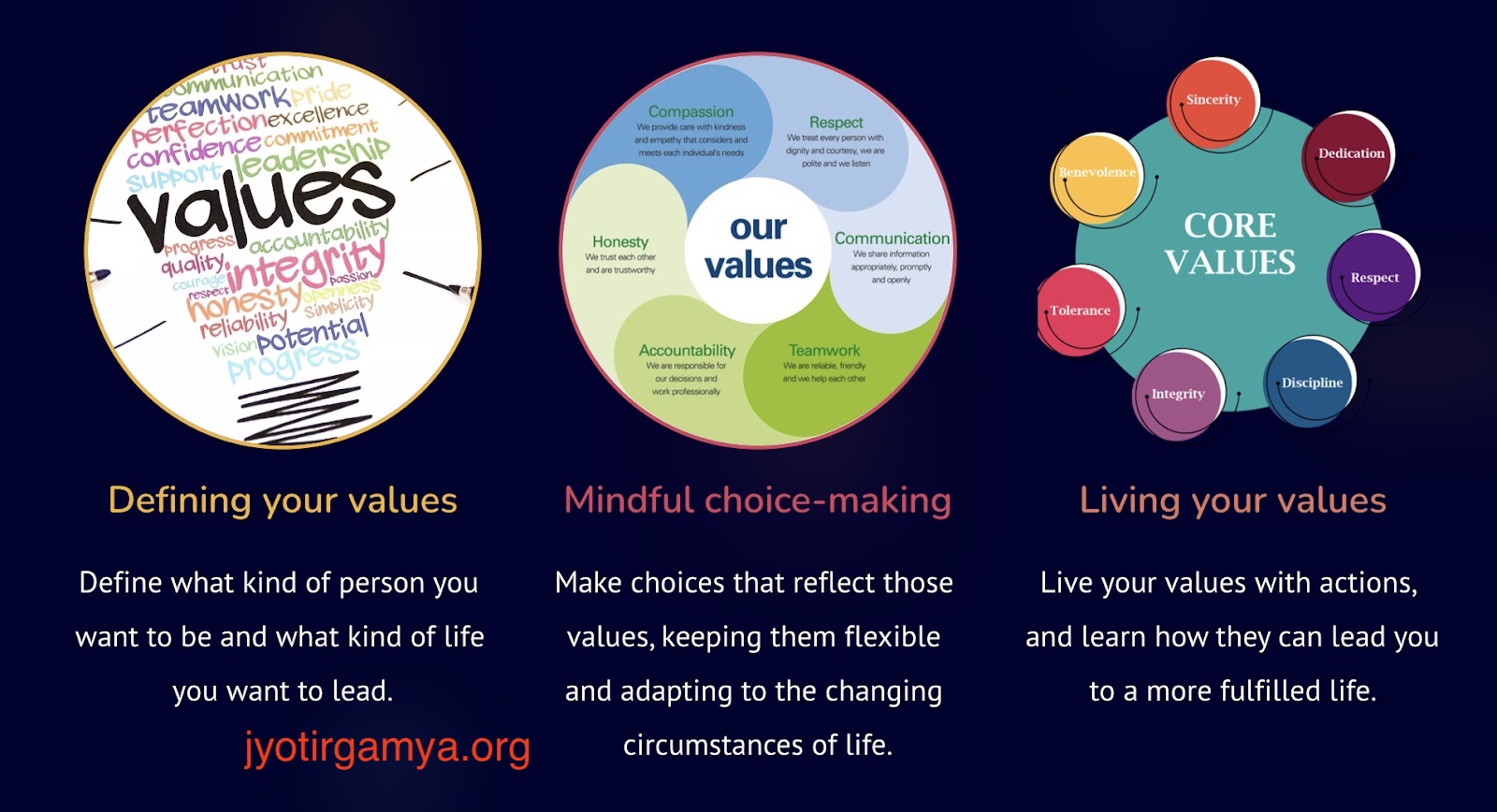
6.4 How to clarify our values
Some tools and exercises can help us clarify our values. For example, the Values Assessment involves identifying our most important values and prioritizing them. Another is to reflect on past experiences and identify what made them meaningful to us. This can provide insight into our values.
6.5 The Role of Values in making decisions and taking action
Our values provide a framework for decision-making and taking action. When we are clear about our values, we can make choices that align with them, leading to a more fulfilling life. By contrast, when we need clarity about our values, we may make decisions that lead us down a path, not in line with our true selves. Therefore, clarifying our values is crucial in finding direction and purpose.
7. Inaction to Committed Action
Making a positive change in our lives often requires more than just setting goals and making plans. We may struggle to take action because of fear, self-doubt, or a lack of motivation. Inaction can keep us stuck in an unfulfilling life and prevent us from achieving our true potential. In contrast, committed action involves aligning our behavior with our values, which requires taking steps toward meaningful and purposeful goals.
7.1 Inaction won’t lead to any changes in our lives.
Inaction is often the result of fear or anxiety about the unknown or the potential for failure. However, doing nothing can lead to more negative outcomes, such as feeling stuck or unfulfilled in life. By avoiding taking action, we may miss valuable opportunities for growth, connection, and personal development.
7.2 Committed action involves aligning our behavior with our values.
Committed action involves making conscious choices that align with our values and goals. It requires us to take intentional steps toward the life we want, despite the challenges and obstacles that may arise. We can move towards a more fulfilling and purposeful life by focusing on our values and what truly matters.
7.3 Russ Harris offers a framework of 7 “R"s
Psychologist Russ Harris offers a framework of 7 “R"s for committed action, including :
- reminding ourselves
- reassessing regularly
- revaluing
- refocusing
- re-engaging
- re-committing
- repeating
This framework can help individuals stay on track with their goals and values, even in adversity or setbacks.
7.4 Intrinsic rewards should be the ultimate goal.
When taking committed action, it’s essential to focus on intrinsic rewards, such as personal growth and fulfillment, rather than external rewards or validation from others. By staying true to our values and goals, we can find purpose and meaning in our actions, ultimately leading to greater satisfaction and happiness.
7.5 There are no “right” or “wrong” behaviors.
It’s important to remember that there are no “right” or “wrong” behaviors when taking committed action. Furthermore, what works for one person may only work for one person. Therefore, it’s essential to experiment, take risks, and learn from our successes and failures to find a path that aligns with our values and leads to a more meaningful life.
8. The Interconnectedness of the Six Core Processes
The six core processes - defusion, present-moment awareness, self-as-context, values, committed action, and flexible perspective-taking - are not separate entities but interconnected processes that affect one another. A change in one process can lead to changes in the other processes, and by mastering each core process, we can create a positive change in our lives. This interconnectedness is crucial to understand when attempting to develop psychological flexibility, as it highlights the importance of focusing on one process and all six.
8.1 Explanation of how the six core processes are interconnected
Each of the six core processes affects the others. For example, if we clarify our values (the fifth core process), we can better commit to actions that align with these values (the fourth core process). Similarly, by practicing present-moment awareness (the second core process), we can defuse unhelpful thoughts (the first core process) and develop a more flexible perspective-taking (the sixth core process). The interconnectedness of these processes emphasizes the need to focus on all of them rather than just one, as they all work together to create psychological flexibility.
8.2 Importance of mastering each core process
Mastering each core process is crucial to creating a positive change in our lives. Each process plays a unique role in developing psychological flexibility, and by focusing on one or two, we may not achieve the desired results. For example, someone who only focuses on defusion (the first core process) may still need to clarify their values (the fifth core process) and commit to actions that align with those values (the fourth core process). Therefore, it is essential to work on mastering each core process to develop psychological flexibility fully.
8.3 How mastering each core process can lead to the necessary changes in our lives
We can create changes that lead to greater psychological flexibility by mastering each core process. For example, by practicing present-moment awareness (the second core process), we may become more aware of our negative self-talk and develop the skill of defusion (the first core process) to distance ourselves from those thoughts. This can then lead to a more flexible perspective-taking (the sixth core process) and allow us to clarify our values (the fifth core process) and commit to actions that align with those values (the fourth core process). We can develop the necessary skills to create meaningful life changes by mastering each core process.
9. Conclusion
ACT (Acceptance and Commitment Therapy) is a powerful approach to improving psychological flexibility, which refers to adapting to changing situations and responding effectively to live’s demands. The six core processes of ACT offer a practical framework for enhancing psychological flexibility: acceptance, cognitive defusion, self-as-context, present-moment awareness, values, and committed action. These processes work together to enable individuals to live more meaningful and fulfilling lives.
The first step in enhancing psychological flexibility is to become aware of the thoughts and feelings that arise in response to challenging situations. Then, rather than trying to change or avoid these experiences, ACT encourages individuals to accept them and observe them without judgment. This leads to increased cognitive flexibility and more effective decision-making.
Through cognitive defusion, individuals can learn to distance themselves from unhelpful thoughts and beliefs, reducing emotional distress and increasing the ability to focus on the present moment. By developing a sense of self-as-context, individuals can identify with their internal values and beliefs rather than being defined by their external circumstances. This perspective shift can help individuals navigate challenges with more resilience and purpose.
Present-moment awareness allows individuals to fully engage in their experiences, which can lead to greater satisfaction and fulfillment. Clarifying personal values provides a roadmap for making decisions and committing actions toward meaningful goals. Committed action involves taking consistent steps towards these goals, even in the face of obstacles and discomfort.
In conclusion, the six core skills of ACT provide a robust framework for enhancing psychological flexibility and living a more fulfilling life. By practicing these skills, individuals can learn to respond more effectively to life’s challenges and to take committed action toward the things that truly matter to them.
Related Articles :
If you think someone would benefit from the article, please do share it with them.
Want to stay connected? Here’s our twitter.